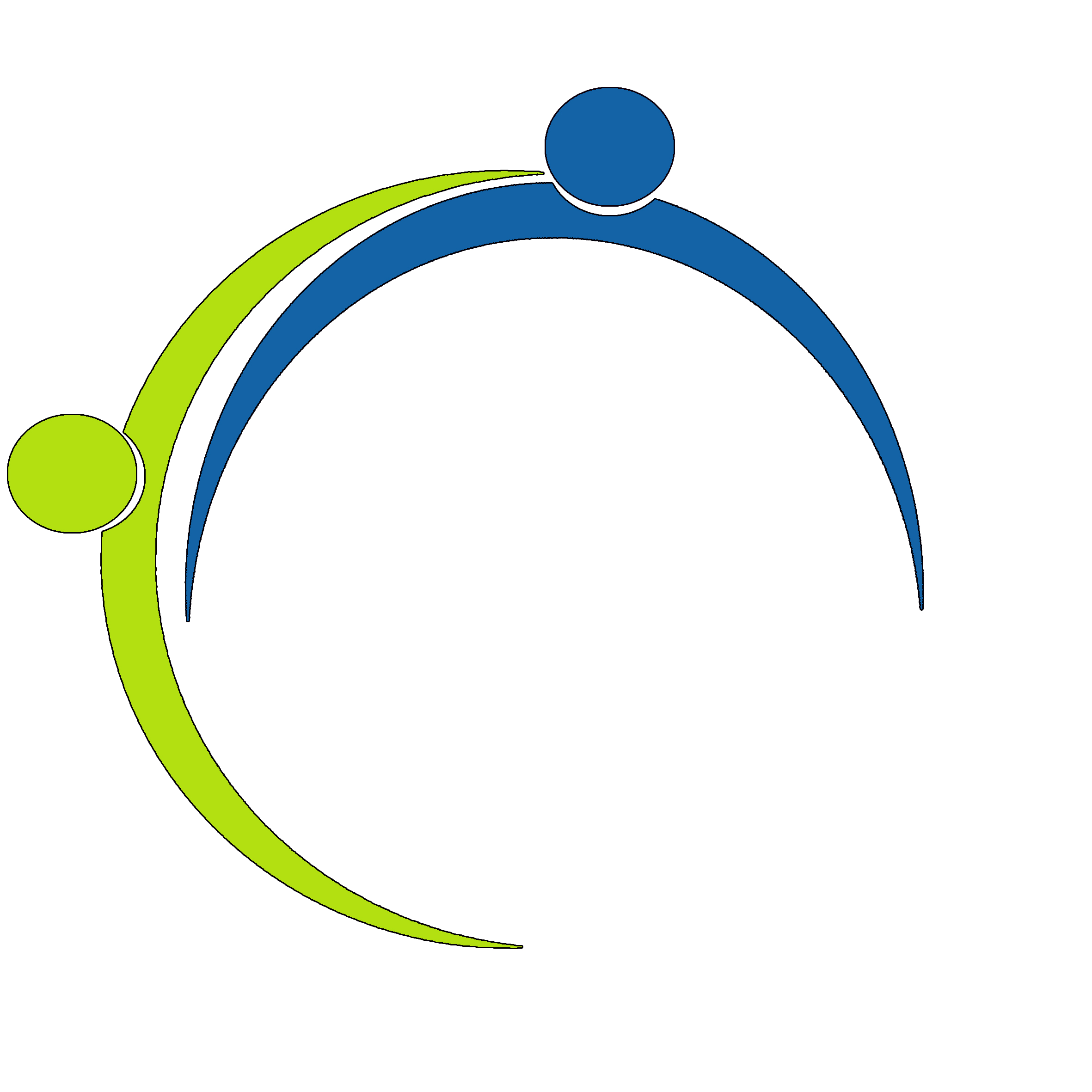THE PRIMARY YEARS PROGRAMME(PYP)
The Primary Years Program (PYP) is designed for the students aged 3-12. We provide Early Years, KG 1 and 2, as well as grade 1, to students aged 3 to 5 and Primary Years Programme,grades 2-6, to students aged 6 to 10. Early Years and Primary Years Programme adopts a student-centred, inquiry-based and a trans-disciplinary teaching philosophy alongside responsible action that has made the framework carry on trusted, timeless and transformational. It helps students to develop a set of values based on international mindedness.
Agency is the central principle to the framework that is connected to the three pillars of the curriculum: the learner, learning and teaching and the learning community. The learners and the learning community have voice, choice and ownership to impact the learning and teaching with the focus on “written, taught, and assessed” curriculum. To learn more about the IB, please visit www.ibo.org.
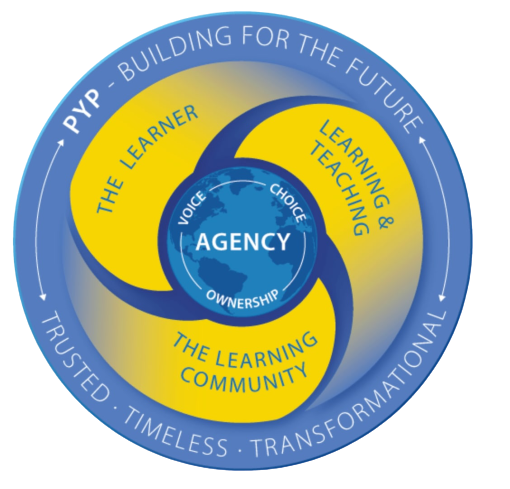
IB LEARNER PROFILE
IB learners strive to become:
Inquirers: They develop their natural curiosity. They acquire the skills necessary to conduct inquiry and research and show independence in learning. They actively enjoy learning and this love of learning will be sustained throughout their lives.
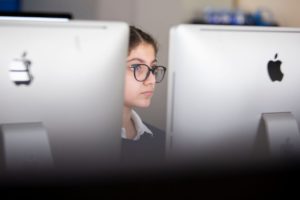
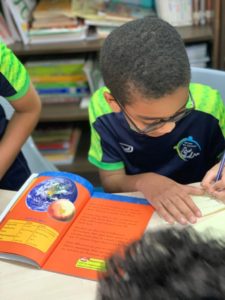
Knowledgeable: They explore concepts, ideas and issues that have local and global significance. In doing so, they acquire in-depth knowledge and develop understanding across a broad and balanced range of disciplines.
Thinkers: They exercise initiative in applying thinking skills critically and creatively to recognise and approach complex problems, and make reasoned, ethical decisions.
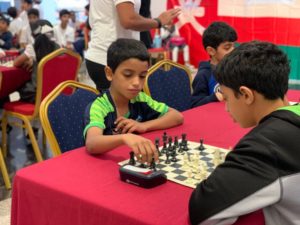
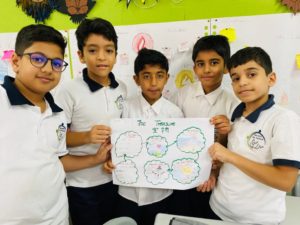
Communicators: They understand and express ideas and information confidently and creatively in more than one language and in a variety of modes of communication. They work effectively and willingly in collaboration with others.
Principled: They act with integrity and honesty, with a strong sense of fairness, justice and respect for the dignity of the individual, groups and communities. They take responsibility for their own actions and the consequences that accompany them.
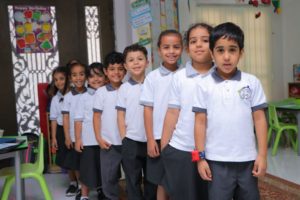
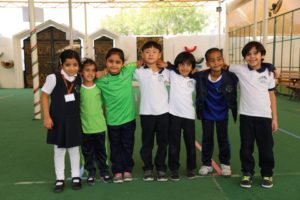
Open-minded: They understand and appreciate their own cultures and personal histories, and are open to the perspectives, values and traditions of other individuals and communities. They are accustomed to seeking and evaluating a range of points of view, and are willing to grow from the experience.
Caring: They show empathy, compassion and respect towards the needs and feelings of others. They have a personal commitment to service, and act to make a positive difference to the lives of others and to the environment.
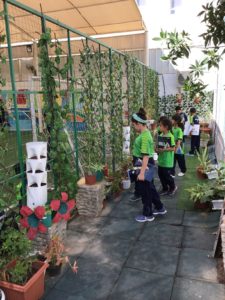
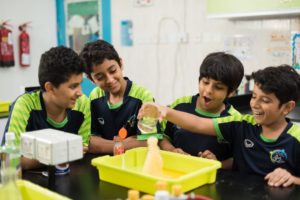
Risk-takers: They approach unfamiliar situations and uncertainty with courage and forethought, and have the independence of spirit to explore new roles, ideas and strategies. They are brave and articulate in defending their beliefs.
Reflective: They give thoughtful consideration to their own learning and experience. They are able to assess and understand their strengths and limitations in order to support their learning and personal development.
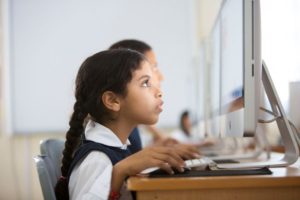
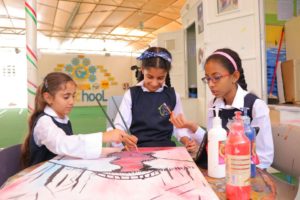
Balanced: They understand the importance of intellectual, physical and emotional balance to achieve personal well-being for themselves and others.
The PYP framework is directed by six transdisciplinary themes of global significance, explored using knowledge and skills gained from six subjects areas( language, mathematics, science, social studies, arts, and personal, social and physical education) as well as transdisciplinary skills( thinking, research, communication, social and self-management skills), with a powerful emphasis on inquiry.
Six Transdisciplinary themes that infuse the PYP:
Inquiry into the nature of the self; beliefs and values; person, physical, mental, social and spiritual health; human relationships including families, friends, communities, and cultures; rights and responsibilities; what it means to be human
Inquiry into orientation in place and time; personal histories; homes and journeys; the discoveries, explorations and migrations of humankind; the relationship between and the interconnectedness of individuals and civilizations, from local and global perspectives
Inquiry into the ways in which we discover and express ideas, feelings, nature, culture, beliefs and values; the ways in which we reflect on, extend and enjoy our creativity; our appreciation of the aesthetic
Inquiry into the natural world and its laws, the interaction between the natural world (physical and biological) and human societies; how humans use their understanding of scientific principles; the impact of scientific and technological advances on society and on the environment.
Inquiry into the interconnectedness of human-made systems and communities; the structure and function of organizations; societal decision-making; economic activities and their impact on humankind and the environment
Inquiry into rights and responsibilities in the struggle to share finite resources with other people and other living things; communities and the relationship within and between them; access to equal opportunities; peace and conflict resolution.
PYP IN MYSCHOOL
Developing international awareness and understanding has always been an integral element in MySchool philosophy. And like The Primary Years Programme (PYP), MySchool fosters international mindedness by focusing on the global concepts that allow students to think deeply. MySchool encourages discovery, research, collaboration and communication. In PYP, students are motivated to think independently and critically to take the responsibility of their own learning.
In MySchool, and with PYP, we pay close attention to students’ language needs and abilities to ensure they fully participate in the program and are able to reach their full potential. Students learn through a bilingual program that offers English as the language of instruction and Arabic as the mother tongue to maintain their cultural identity. In MySchool, we believe that when students learn an additional language, other than their mother tongue language, they will develop a broader understanding of other cultures as well as accepting others with all the respected differences.
This is the type of students we wish to have in Myschool. These are the students that will graduate from MySchool, the PYP school. That is the kind of students who struggle to establish a personal set of values, will apply the international mindedness in real life and will develop and flourish.
PYP Coordinator in MySchool
To support the school implementation of the PYP program, Mrs. Pari Bagheri has been appointed as the PYP coordinator. Mrs. Pari Bagheri will guide, mentor and support the teachers as well as the students to develop an inquiry-based teaching/learning method with great emphasis on the IB learner profiles and transdisciplinary skills.
Mrs. Bagheri believes, “PYP enables our children to be international minded citizens, ready to take the challenges in the global community”
Through scheduled and regular meetings, the pyp coordinator, the pedagogical leaders of the school and the teachers will collaboratively work to plan for and to set the suitable learning environment for our kids. MySchool is the place where students are encouraged to ask questions, inquire into answers, deeply think about personal, local and international issues and reflect on their goals and achievements.
Mrs. Pari Bagheri is also responsible for keeping all the PYP community up-to-date with all the IB documents and news. She offers her support to parents and students, as well. So, do not hesitate to contact her via parii@myschool.edu.om
References:
International Baccalaureate Organization website, Primary Years Programme,
a guide to PYP parents: 5 ways you could support your child as a PYP parent
